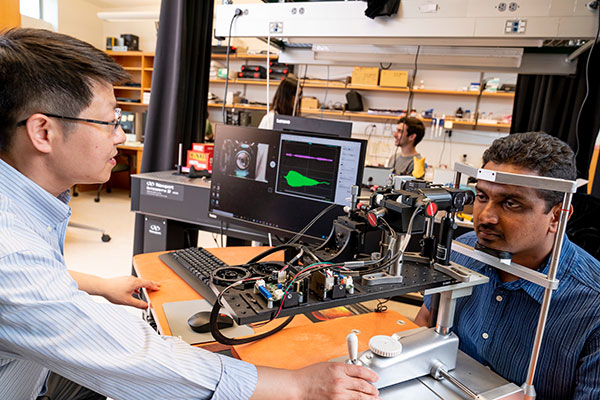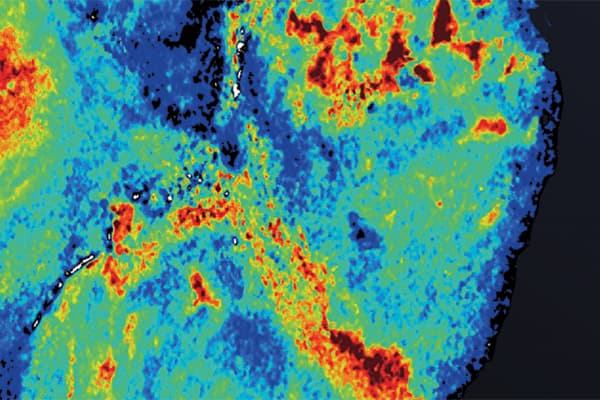It's easy to start your application.
Graduate Programs
Master of Science in Imaging Science

The McKelvey School of Engineering offers a unique interdisciplinary master of science in imaging science program that prepares graduates for success in industry or to advance to doctoral studies.
Students will be taught and mentored by faculty from departments and programs throughout Washington University in St. Louis, including Biomedical Engineering, Electrical & Systems Engineering, Computer Science & Engineering, Mechanical Engineering & Materials Science and the School of Medicine.
WashU has a long history as a leading institution in imaging science research, with hundreds of expert faculty researching sensors, physical and mathematical modeling, image representation, algorithm development, deep learning methods, artificial intelligence, performance quantification, computational implementations and implementations of imaging systems. McKelvey Engineering aims to equip graduates with practical application skills and the physical and mathematical foundations of engineering principles and imaging sciences.
Candidates must accumulate a total of 30 graduate credits, have a cumulative grade point average of 2.7 or better and satisfy the core curriculum requirements. Courses must be taken for a grade (i.e. not Pass/No Pass).
Degree requirements
The master of science in imaging science requires 30 unit hours, including 13 credit hours from the core list (two mathematics and physics courses, one seminar course, and one computation and one application course each selected from the list below) and the remaining credits from the electives list. Up to six of the 30 credits can be 4000-level courses. The remaining 24 must be 5000-level or above.
Required core imaging science courses (13 credit hours)
Mathematics and physics of imaging modalities courses (must complete two from this list):
- BME 5700 (BME 570 CSE/ESE 5931): Mathematics of Imaging Science (three credit hours)
- BME 5910 (BME 591): Biomedical Optics I: Principles (three credit hours)
- BME 5940 (BME 594): Ultrasound Imaging (three credit hours)
- ESE 5820 (ESE 582/BME 5820): Fundamentals and Applications of Modern Optical Imaging (three credit hours)
- ESE 5890 (ESE/BME 589): Biological Imaging Technology (three credit hours)
Computational imaging courses (must complete one from this list):
Due to the partial overlap between ESE 417 Introduction to Machine Learning and Pattern Classification and CSE 417T Introduction to Machine Learning, it is recommended that students take only one, as only one of these courses can count towards the curriculum requirements.
- ESE 4150 (ESE 415): Optimization (three credit hours)
- ESE 4170 (ESE 417): Introduction to Machine Learning and Pattern Classification (three credit hours)
- ESE 5932: Computational Imaging Science (three credit hours)
- CSE 4107 (CSE 417T): Introduction to Machine Learning (three credit hours)
- CSE 5105 (CSE 515T): Bayesian Methods in Machine Learning (three credit hours)
- CSE 5107 (CSE 517A): Machine Learning (three credit hours)
Imaging applications courses (must complete one from this list):
- BME 5440 (BME 544): Biomedical Instrumentation (three credit hours)
- BME 5920 (BME 592): Biomedical Optics 2: Advanced Topics in Biophotonics (three credit hours)
- CSE 5509 (CSE 559A): Computer Vision (three credit hours)
Seminar course:
- ESE 5981 (ESE 596/BME 506): Seminar in Imaging Science and Engineering (one credit hour)
Additional electives (may choose from the list below and above to meet the 30 units required):
- BIOL 5146: Principles and Applications of Biological Imaging (three credit hours)
- BIOL 5147: Contrast Agents for Biological Imaging (three credit hours)
- BME 5999 (BME 500): Independent Study, non-thesis track (three credit hours)
- BME 7889 (BME 599): Master Research, thesis track (six credit hours)
- ESE 4380 (ESE 438/538A): Applied Optics (three credit hours)
- ESE 5200 (ESE 520): Probability and Stochastic Processes (three credit hours)
- ESE 5933 (ESE/BME 5933): Theoretical Imaging Science (three credit hours)
- ESE 5970 (ESE 5934): Practicum in Imaging Science (three credit hours)
- CLNV 5070 (CLNV 510): Ethical and Legal Issues in Clinical Research (three credit hours)
PhD in Imaging Science
WashU offers one of only two doctoral degree programs in imaging science in the United States. Our interdisciplinary curriculum focuses on the technology of imaging with applications ranging from cancer diagnosis to virtual reality.

